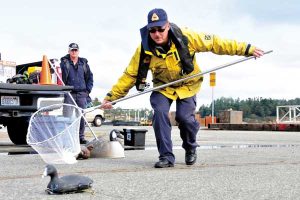Base employees practice oiled animal rescue
By Lookout on Oct 20, 2014 with Comments 0

Ken Cawley practices his stealth, sneaking up on a decoy attached to a fishing line, as part of the First Responder Oiled Animal Capture Course held at D Jetty last week.
Rescuing oil-slicked animals and birds is now a skillset of a few base employees.
To ensure they can do the job, 10 people from Port Operation and Emergency Services (POESB), Fleet Maintenance Facility, and the Coast Guard took the First Responder Oiled Animal Capture course with Focus Wildlife Canada last week.
Standing in for the real thing was a remote controlled four-wheeled water fowl that zipped around the parking lot near D Jetty in Colwood and Esquimalt Harbour, as students took turns catching it with a net.
“It’s not as good as the real thing, but it’s a lot safer,” says Chris Battaglia, co-founder of Focus Wildlife Canada and course instructor.
Battaglia and Focus Wildlife Canada provide professional spill response and training across Canada and the United States. Part of this training includes the capture or deterrence of animals in an environment affected by a spill.
Students were educated on the responsibilities of a first responder in an oil spill situation. This includes how to evaluate a spill, the threat it may pose to wildlife, and how to intervene when it comes to oiled animals.
“It’s about giving them the tools needed to deal with a situation before the specialists arrive,” says Battaglia. “Obviously they won’t be able to deal with a large volume of oiled birds on their own, but that first 24 to 48 hours can be critical, and it’s important to have people know what to do in those situations.”
The course also included hands-on oiled animal capture training. Using both floating and rolling decoys, students scooped the models up in nets in the harbour and on the ground.
“There is a way to do it quickly and safely, and that’s the way we want to do it,” says Battaglia. “You want to limit the injury to the animal, but make sure it doesn’t get away. If it gets away there’s nothing you can do for it.”
Protection of the marine environment surrounding the base is a top priority for DND, says Lyle Fairley, Acting Marine Environmental Emergency Response Officer for POESB.
“We are the stewards of the harbour and it’s our responsibility to take care of it,” he says. “In the unlikely event that we have a spill at our facility, we need to be able to respond properly and keep the environment as safe as possible.”
Being prepared to tackle any issue is part of his work.
“We might only be able to help a few animals, but it’s better than not being able to help any,” he says. “When you get down to it, oil floats on water, and a lot of animals spend their time on or in that water. If they’re put in that position, we need to be able to help somehow.”
The course was developed by Battaglia and his wife after volunteering to save wildlife from certain death.
“I saw there was a real gap in professional spill response and animal capture, outside of non-profits, so my wife and I decided to do something about it,” he says.
Shawn O’Hara, Staff Writer
Filed Under: Top Stories
About the Author:





